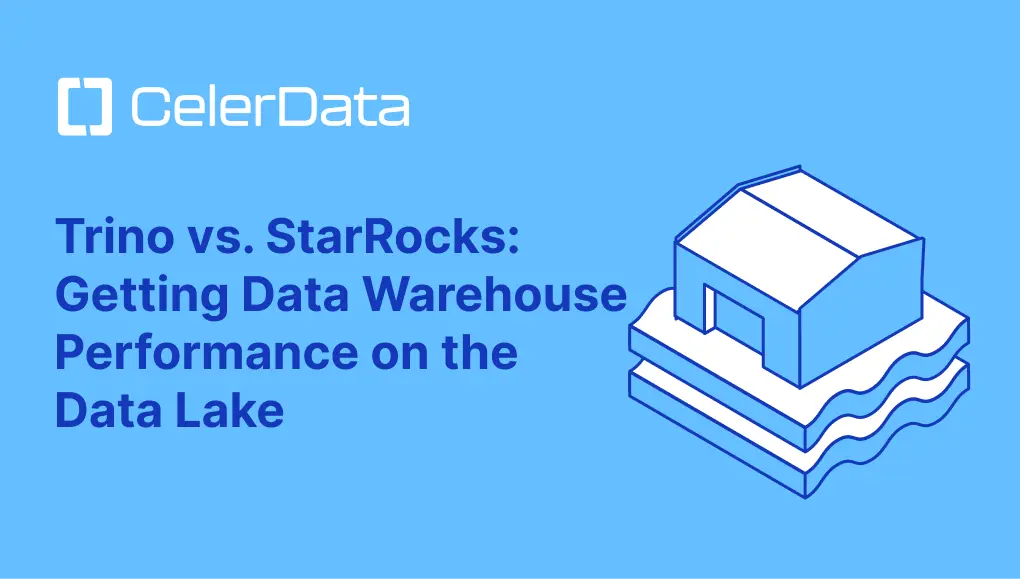
Azure Data Lake

Join StarRocks Community on Slack
Connect on SlackWhat is a Data Lake?
A data lake is a centralized repository designed to store vast amounts of raw data in its native format. This includes structured, semi-structured, and unstructured data. Data lakes offer high scalability, allowing organizations to handle petabytes of information. This capability is crucial for big data applications. Data lakes support advanced analytics, machine learning, and real-time processing. The flexibility to store data without predefined schemas enables diverse data types to coexist.
Differences between Data Lakes and Data Warehouses
Data lakes and data warehouses serve distinct purposes. Data lakes store raw data in its original form, making them ideal for exploratory data analysis. Data warehouses, on the other hand, store processed and structured data optimized for reporting and analysis. Data lakes offer greater flexibility and scalability compared to data warehouses. However, data warehouses provide faster query performance due to their structured nature. Organizations often use both solutions to complement each other.
Introduction to Azure Data Lake
Overview of Azure Data Lake Services
Azure Data Lake is a highly scalable and secure data storage and analytics service provided by Microsoft Azure. The platform is engineered to store and process vast amounts of data with ease. Azure Data Lake can handle petabytes of information, making it ideal for big data applications. The service integrates seamlessly with existing IT infrastructures and applications. This includes compatibility with various data sources, business intelligence tools, and analytics platforms.
Key Features and Capabilities
Azure Data Lake offers numerous features that enhance its functionality:
-
Scalability: The platform can scale to accommodate large datasets, ensuring efficient data management.
-
Security: Robust security measures protect data, including encryption and access control.
-
Integration: Seamless integration with other Azure services, such as Azure Data Factory and Azure HDInsight, facilitates comprehensive data workflows.
-
Advanced Analytics: Support for various analytics and machine learning tools enables deeper insights from data.
-
Cost Efficiency: The pay-as-you-go pricing model ensures cost-effective data storage and processing.
Azure Data Lake supports multiple programming languages, including U-SQL, R, Python, and .NET. This flexibility allows developers, data scientists, and analysts to work with the tools they prefer. The platform's ability to handle batch, streaming, and interactive analytics simplifies complex data processing tasks. Azure Data Lake also provides high-performance analytics workloads, making it a go-to choice for businesses looking to manage their data efficiently and intelligently.
Components of Azure Data Lake
Azure Data Lake Storage
Storage Tiers and Scalability
Azure Data Lake Storage offers multiple storage tiers to optimize cost and performance. The platform supports hot, cool, and archive tiers. Each tier caters to different data access patterns. The hot tier provides low-latency access for frequently accessed data. The cool tier is suitable for infrequently accessed data, offering lower storage costs. The archive tier stores rarely accessed data at the lowest cost.
Scalability is a key feature of Azure Data Lake Storage. The platform can handle petabytes of data seamlessly. Organizations can scale their storage needs up or down based on demand. Azure Data Lake Storage integrates with Hadoop Distributed File System (HDFS). This compatibility ensures smooth data processing for big data applications. The platform's ability to store data in any format enhances flexibility.
Security and Compliance Features
Security is paramount for Azure Data Lake Storage. The platform employs robust encryption methods to protect data. Encryption occurs both at rest and in transit. Access control mechanisms ensure that only authorized users can access data. Role-based access control (RBAC) and Azure Active Directory (AAD) integration enhance security.
Compliance features are also integral to Azure Data Lake Storage. The platform adheres to various industry standards and regulations. These include GDPR, HIPAA, and ISO certifications. Organizations can rely on Azure Data Lake Storage to meet their compliance requirements. The platform's security and compliance features make it a trusted choice for enterprises.
Azure Data Lake Analytics
Data Processing and Querying
Azure Data Lake Analytics simplifies big data processing. The service allows users to run massively parallel data transformation and processing programs. Users can write queries using U-SQL, a language that combines SQL with C#. This flexibility enables complex data processing tasks. Azure Data Lake Analytics can process data stored in Azure Data Lake Storage and other sources.
Querying capabilities are a highlight of Azure Data Lake Analytics. The service supports interactive querying, allowing users to gain insights quickly. Batch processing capabilities handle large-scale data transformations efficiently. Azure Data Lake Analytics provides a pay-per-job pricing model. This model ensures cost-effective data processing.
Integration with Other Azure Services
Integration with other Azure services enhances the functionality of Azure Data Lake Analytics. The service works seamlessly with Azure Data Factory for data orchestration. Azure HDInsight integration enables the use of open-source analytics frameworks. These include Apache Spark, Hadoop, and HBase. Azure Machine Learning integration facilitates advanced analytics and machine learning workflows.
Azure Data Lake Analytics also integrates with Power BI. This integration allows users to visualize data and create interactive reports. The platform's ability to work with various Azure services streamlines data workflows. Organizations can build comprehensive data solutions using Azure Data Lake Analytics.
Benefits of Using Azure Data Lake
Scalability and Flexibility
Handling Large Volumes of Data
Azure Data Lake excels at managing vast datasets. The platform can store petabytes of data without performance degradation. Organizations can ingest data from multiple sources, including structured, semi-structured, and unstructured formats. This capability ensures that businesses can handle diverse data types efficiently. High scalability allows for seamless expansion as data volumes grow.
Adapting to Changing Business Needs
Azure Data Lake offers dynamic adaptability to evolving business requirements. The platform supports both batch and real-time data processing. This flexibility enables organizations to adjust their data strategies quickly. Businesses can scale storage and compute resources up or down based on demand. The ability to integrate with various analytics tools enhances responsiveness to market changes.
Cost Efficiency
Pay-as-You-Go Pricing Model
Azure Data Lake employs a pay-as-you-go pricing model. Organizations only pay for the storage and compute resources they use. This model eliminates the need for large upfront investments. Businesses can manage costs effectively by scaling resources according to their needs. The pay-as-you-go approach ensures cost efficiency for both small and large enterprises.
Cost Management Tools
Azure Data Lake provides robust cost management tools. These tools help organizations monitor and control their spending. Features include detailed billing reports and cost analysis dashboards. Businesses can set budgets and receive alerts when approaching spending limits. Cost management tools enable organizations to optimize their resource usage and reduce unnecessary expenses.
Use Cases of Azure Data Lake
Big Data Analytics
Real-Time Data Processing
Azure Data Lake excels in real-time data processing. Organizations can ingest and analyze streaming data from various sources. This capability enables businesses to make timely decisions. Retail companies use real-time analytics to optimize inventory management. By analyzing sales data instantly, retailers can adjust stock levels and avoid shortages.
Financial institutions benefit from real-time fraud detection. Azure Data Lake processes transaction data as it occurs. This allows banks to identify suspicious activities immediately. The ability to act quickly reduces potential losses and enhances security.
Machine Learning and AI Applications
Azure Data Lake supports advanced machine learning and AI applications. Data scientists can train models on large datasets stored in the lake. This leads to more accurate predictions and insights. Retailers use machine learning to personalize marketing campaigns. By analyzing customer behavior, companies can target promotions effectively.
Healthcare providers leverage Azure Data Lake for predictive analytics. Machine learning models help predict patient outcomes based on historical data. This improves treatment plans and patient care. The integration with Azure Machine Learning simplifies the deployment of these models.
Data Archiving and Backup
Long-Term Data Storage Solutions
Azure Data Lake offers robust long-term data storage solutions. Organizations can archive data that is not frequently accessed. This ensures that valuable information remains available for future use. The platform's scalability allows for the storage of vast amounts of data. Businesses can store historical records without worrying about space constraints.
Compliance with regulatory requirements is crucial for many industries. Azure Data Lake provides secure storage that meets various standards. Companies can retain data for the required periods and ensure its integrity. This is particularly important for sectors like finance and healthcare.
Disaster Recovery Scenarios
Disaster recovery is a critical aspect of data management. Azure Data Lake provides reliable backup solutions. Organizations can replicate data across different regions. This ensures that data remains accessible even during local outages. The platform's high availability features minimize downtime.
Businesses can quickly restore operations after a disaster. Azure Data Lake's integration with other Azure services streamlines the recovery process. For example, data can be restored to Azure Data Factory for further processing. This comprehensive approach ensures business continuity and data integrity.
Best Practices for Implementing Azure Data Lake
Data Ingestion Strategies
Batch vs. Stream Processing
Organizations must choose the right data ingestion strategy to maximize Azure Data Lake's potential. Batch processing involves collecting and processing data in large chunks at scheduled intervals. This method suits scenarios where real-time data is not critical. For example, businesses can use batch processing for end-of-day reporting or historical data analysis.
Stream processing, on the other hand, involves continuous data ingestion and processing in real time. This approach is essential for applications requiring immediate insights. Retailers can use stream processing to monitor live sales data and adjust inventory levels dynamically. Financial institutions can detect fraudulent transactions as they occur.
Choosing between batch and stream processing depends on specific business needs. Some organizations may benefit from a hybrid approach, combining both methods for optimal performance.
Data Quality and Governance
Maintaining high data quality is crucial for effective data lake implementation. Poor data quality can lead to inaccurate analytics and misguided decisions. Organizations should establish robust data governance frameworks to ensure data integrity. This includes setting up data validation rules, cleansing processes, and monitoring mechanisms.
Data governance also involves defining clear data ownership and stewardship roles. Assigning responsibilities helps maintain accountability and ensures consistent data management practices. Implementing metadata management tools can enhance data discoverability and usability. These tools provide context and lineage information, making it easier to trace data origins and transformations.
Security and Compliance
Access Control and Encryption
Security remains a top priority when implementing Azure Data Lake. Organizations must enforce strict access control measures to protect sensitive data. Role-based access control (RBAC) allows administrators to assign permissions based on user roles. This ensures that only authorized personnel can access specific data sets.
Encryption further enhances data security. Azure Data Lake employs encryption both at rest and in transit. This means that data remains protected during storage and transmission. Organizations should regularly update encryption keys and follow best practices for key management.
Regulatory Compliance Considerations
Compliance with industry regulations is essential for many organizations. Azure Data Lake offers features that help meet various regulatory requirements. The platform adheres to standards such as GDPR, HIPAA, and ISO certifications. Businesses must stay informed about relevant regulations and ensure their data practices align with these standards.
Implementing audit trails and logging mechanisms can aid in compliance efforts. These tools provide detailed records of data access and modifications. Regular audits and reviews help identify potential compliance gaps and address them promptly.
By following these best practices, organizations can unlock the full potential of Azure Data Lake. Proper data ingestion strategies, robust data governance, and stringent security measures ensure efficient and secure data management.
Conclusion
Azure Data Lake offers a comprehensive solution for modern data management. The platform provides scalability, security, and seamless integration with other Azure services. Organizations can efficiently store and analyze vast amounts of data. Azure Data Lake supports advanced analytics and machine learning applications.
The importance of Azure Data Lake cannot be overstated. Businesses gain valuable insights and improve decision-making processes. The platform's flexibility and cost-efficiency make it an ideal choice for various industries.
Explore Azure Data Lake to unlock the full potential of your data. Leverage its capabilities to drive innovation and achieve business goals.



.jpg)